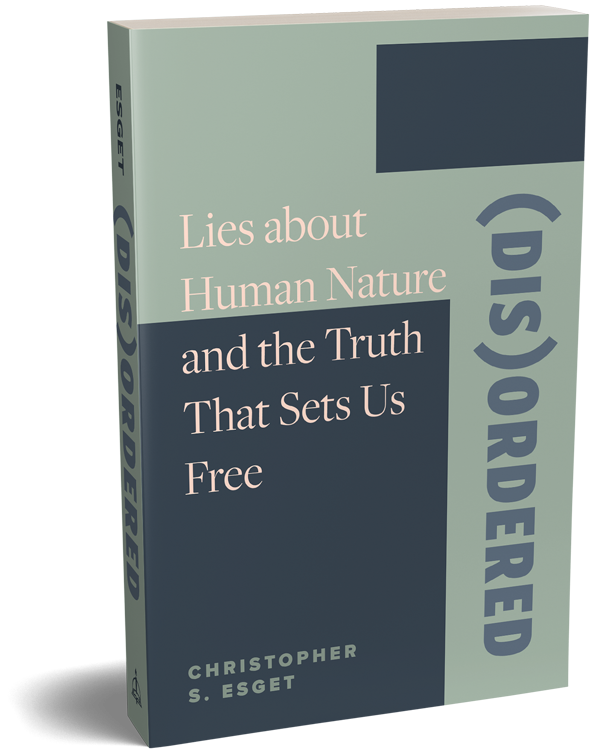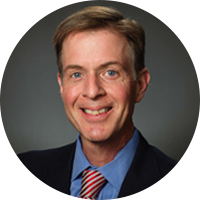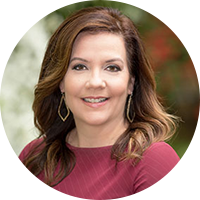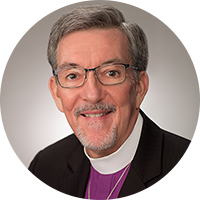
“This is a must-read book”
– Timothy S. Goeglein, vice president, External and Government Relations, Focus on the Family
Author Rev. Christopher S. Esget explains how God’s Word speaks differently about human nature than contemporary culture does. Explore contemporary challenges to the biblical worldview and how Scripture shows us healing through Christ.
(Dis)Ordered will cover:
Seeking Authenticity
“God’s Word teaches us how to think about ourselves: ‘Know that the LORD, He is God! It is He who made us, and we are His’ (Psalm 100:3). This can also be translated ‘It is He who made us, and not we ourselves.’ The contemporary quest for ‘authenticity’ turns this on its head: ‘It is I who make me, and no one else.’” (p. 15)
“Curved in on ourselves, we abuse the gifts God has given. So the desire for food can overwhelm a person to the point of eating too much unhealthy food. The natural desire for sleep leads some to rest too much, and they become indolent. A physician prescribes powerful drugs to ease pain, but the patient becomes addicted and the medicine becomes a destructive poison. How can we distinguish rightly ordered desire from disordered desire?” (p. 50)
Understanding Disordered Desire
Responding to Transgender Issues
“This problem is exacerbated by human existence being reduced to gender and sexuality by the sexual revolutionaries. Since this is a matter of will and not body, the transgender revolution is the final triumph of the Gnostic conception of reality, which subordinates the body to the soul and renders the material world something from which we must be liberated.” (p. 96)
“The battle against sin means not only to watch with our eyes but also to watch over our eyes. Watching your eyes means keeping a constant guard against what you allow into your mind through visual stimuli. Once the corrupting influences have been seen, they are not easy to remove.” (p. 174)
Guarding Against Sin
The Quest for Authenticity
“God’s Word teaches us how to think about ourselves: “Know that the Lord, He is God! It is He who made us, and we are His” (Psalm 100:3). This can also be translated “It is He who made us, and not we ourselves.” The contemporary quest for “authenticity” turns this on its head: “It is I who make me, and no one else.” (pg. 15)
Disordered Desire
“Curved in on ourselves, we abuse the gifts God has given. So the desire for food can overwhelm a person to the point of eating too much unhealthy food. The natural desire for sleep leads some to rest too much, and they become indolent. A physician prescribes powerful drugs to ease pain, but the patient be- comes addicted and the medicine becomes a destructive poison. How can we distinguish rightly ordered desire from disordered desire?” (pg. 50)
Responding to Transgender Issues
“This problem is exacerbated by human existence being reduced to gender and sexuality by the sexual revolutionaries. Since this is a matter of will and not body, the transgender revolution is the final triumph of the Gnostic conception of reality, which subordinates the body to the soul and renders the material world something from which we must be liberated.” (pg. 96)
Guarding Against Sin
“The battle against sin means not only to watch with our eyes but also to watch over our eyes. Watching your eyes means keeping a constant guard against what you allow into your mind through visual stimuli. Once the corrupting influences have been seen, they are not easy to remove.” (pg. 174)
Praise for (Dis)Ordered

In 1983, Nobel Prize recipient Aleksandr Solzhenitsyn delivered the most memorable speech of his distinguished career. He said the decline of great civilizations commence when “men have forgotten God.” In Christopher Esget’s magnificent new book, he demonstrates that the vigorous cultural and societal war being prosecuted against natural law norms has consequences propelling the destruction of marriages, families, and children. Repudiation and rebellion are the sad, recurring motifs. Yet the glory of Esget’s powerful analysis is that Christian hope and the seeds of authentic regeneration are possible even in a spiritual desert where transgressive ideas seem omnipresent. This is a must-read book, worthy of Solzhenitsyn’s matchless rigor, intellectual goodness, and moral duty to be intelligent.
- Timothy S. Goeglein, vice president, External and Government Relations, Focus on the Family

In recent years, there have been many attempts to explain how our discourse became dominated by destructive ideas such as Marxism, transgenderism, emotivism, and plain old narcissism. But nearly all those explanations have failed to discuss the true and singular antidote to our ideological ailments—the Gospel of Jesus Christ. With stunning clarity, Esget has written a highly accessible book that brings together theology, politics, and culture to deliver the message that a light shines in the darkness and no “ism” can overcome it.
- Mollie Ziegler Hemingway, editor in chief, The Federalist

Christopher Esget is the consummate parish pastor who warns us against our disordered world and sets before us God’s reordering of all things in Christ. We face what we think of as new challenges to the faith of the Church and the piety of her children. Esget shows that the ancient revelation of God in Christ, delivered once and for all through the Word of the prophets and apostles, responds to all these challenges with grace, encouragement, and comfort for the troubled soul. This is soul care at its best!
- Scott R. Murray, PhD, senior pastor, Memorial Lutheran Church; vice president, LCMS West-Southwest Region
About the Author
Rev. Christopher Esget is senior pastor of Immanuel Evangelical-Lutheran Church in Alexandria, Virginia, where he has served since 2001. He previously served Bethel Lutheran Church in Du Quoin, Illinois. He and his wife, Kassie, have one son.
Esget is the Fifth Vice President of the LCMS (representing the East-Southeast Region). He holds a bachelor's degree in music from Berklee College, Boston, and master of divinity and master of sacred theology degrees from Concordia Theological Seminary, Fort Wayne, Indiana. He enjoys playing classical and jazz piano.


